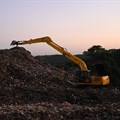It is difficult to predict what trends will shape an industry for the year ahead, but one thing that is abundantly clear is that there is a wave of public awareness towards environmental issues in South Africa.

Brian Küsel, director of BiobiN South Africa.
Sparked by the proposed seismic surveys on the Wild Coast, the public was quick to raise their voice to protect the environment and boycott the implicated party.
The amount of collective energy put into this campaign was enough to make one of the world’s biggest energy corporates ‘wave the white flag’ and halt its activities in response to public pressure.
Public environmental consciousness to influence waste management
While this has been a significant win for the public and Wild Coast, Brian Küsel, director of BiobiN South Africa, believes that there are many other pressing environmental issues that will garner public attention, and one is how businesses manage their organic waste.
“The public already knows the impacts of waste and we have especially seen this with plastics and packaging. Knowing the devastating impacts of plastic accumulation in the ocean, consumers are selective in choosing the retail outlets that they shop at.
“Shops that offer recyclable packaging, compostable alternatives and reusable bags seem to get the nod, while shops that use excessive amounts of plastic packaging are often called out for it,” Küsel says.
While recycling plastic products and packaging is important to keep it out of the environment and create a circular economy, keeping food and organic waste from going to landfill should be just as much of a priority. The retail sector in South Africa is especially responsible for generating large volumes of food and organic waste where a large portion still goes to landfill.
“Landfill is not a sustainable option for food and organic waste, it is very problematic in fact,” says Küsel. “We need to start looking at organic waste the same way we look at materials like plastics, closing the loop on the organic waste stream to keep it out of landfill and the environment.”
The circular economy has been a term that has received increased attention, implying that waste should be seen and repurposed as a resource that has economic value. Küsel adds that “with on-site composting units, we can create a circular economy for organic waste on-site”.
The compost on-site model
With or without compostable bags, shopping malls have the opportunity to produce and use high-grade compost within the gardens on-site.
This shows consumers a sustainable way of managing food and organic waste and that this waste stream has value. Malls that do not use the compost on-site often send the compost to nearby community initiatives such as food gardens.
“With this model, the infrastructure is in place to promote a circular economy with organic food waste and generate awareness among consumers to support retail outlets that do so,” Küsel says.
With more market drivers like organic waste landfill restrictions and with the improvement of on-site composting technology, more public attention is likely to be placed on retail, expecting shopping centres to offer consumers a better option than sending food and organic waste to landfill.


































